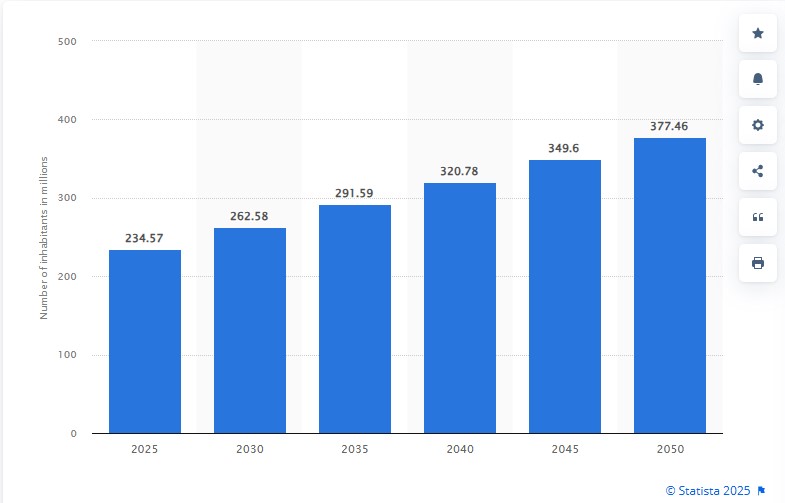With the rising cost of living in Nigeria, fueled by inflation and economic downturn, housing has become an increasing burden for tenants nationwide. The sharp rise in rent has forced some families to relocate to rural areas where housing is more affordable, while others continue to struggle to make ends meet in the cities.
Urban residents face escalating rental costs, largely driven by the removal of petroleum subsidies and the floating exchange rate policy of the current administration. The economic strain is severe, as many landlords continue to raise rents due to the rising cost of building materials and property maintenance.
In 2022, Nigeria recorded a 50% increase in rent across major cities in the country such as Lagos, Abuja and Port-Harcourt. Nigeria’s growing population has further compounded the housing crisis. As of 2025, the country’s population is estimated to exceed 223 million, making it the seventh most populous nation in the world. With an annual growth rate of approximately 2.1%, projections suggest that by 2050, Nigeria’s population could surpass 377 million, highlighting the nation’s rapid demographic expansion and increasing demand for housing.
Nigeria Population Projection

As a result, shop owners and prospective tenants have been significantly impacted by the skyrocketing rent prices, with growing complaints about property agents and landlords imposing exorbitant fees. New Daily Prime investigations reveal a disturbing trend in recent days, as landlords and agents aggressively demand multiple charges from tenants, particularly for new apartments and commercial spaces in major cities across Nigeria.
Public Reactions
Some Nigerian home seekers have voiced their frustration over skyrocketed housing and shop rents.
For instance, Debby Addane fingered agents as being responsible for collecting nearly half of the rent charges as agency fees.
Also, Chukwu Nonso, a new tenant, expressed dismay over an unexpected increase in house rent despite being a new tenant in the apartment. He said that he and other tenants rejected the hike, citing the already high cost of moving into the apartment for their rejection.
In the same vein, Queen Evelyn, an Awka resident in Anambra State capital, lamented that agents in Awka have made life unbearable for prospective tenants, especially students of Nnamdi Azikiwe University.
Also, Olanrewaju Samuel, a facebook user, blamed agents for pressuring landlords to raise their house rents . He therefore,called on the government to introduce policies to regulate tenancy charges.
Vanessa Uche also criticized the trend, alleging that both landlords and agents are worsening the economic crisis for Nigerians.
In Rivers State, Mr. Prince Eke told New Daily Prime, how he was visibly shocked when he was informed that his rent had increased from N80,000 to N200,000 in late 2023.
READ ALSO: Types of houses N50m can buy in Lagos
He added that following the appeal by tenants, the landlord reduced the rent to N160,000. Speaking in the most emotional manner , he admitted that the huge financial burden had impacted negatively on his mental health.
“It is like losing someone dear,” he remarked, emphasizing the emotional and financial toll of the sudden rent hike. Eke urged landlords to show understanding and reduce rents in the light of the economic hardship facing many Nigerians.

Similarly, Mrs. Abinofor Miriam, a hairdresser whose shop is located on SARS Road in Port-Harcourt, disclosed her plans to relocate to another area where shop rent is cheaper. She added that she took the decision to relocate because her new landlord who recently bought the building has increased her shop rent from N350,000.00 to N1 million,citing planned renovations as the reason for the increase. “What will I be selling after renovation to afford renewing the shop rent,” she lamented.
Realtors fault Allegations
Contrary to the widespread accusation against property agents, many of them have dismissed claims of them collusing with house owners to raise rents.
Speaking on the same issue, Mr. Light Ikenna, a realtor with over two years experience , refuted the allegations, asserting that agents have no control over landlords’ pricing decisions.
“It is a fallacy. No agent has the right to influence rent prices. Many agents are also tenants and understand the burden of rent payments. This idea that we conspire with landlords to hike rents,” Ikenna said.
He further explained that real estate operates as a private sector, and property owners are not bound by government-imposed price regulations.
He added that in states like Delta, there is no fixed percentage on agency fees, allowing tenants to choose alternative agents if dissatisfied.
He further explained that real estate operates as a private sector, and property owners are not bound by government-imposed price regulations
Ikenna emphasized that rather than blaming agents, the government should take proactive measures to address the housing crisis. “Government cannot regulate rent prices if they do not provide basic amenities for property owners. Many landlords struggle with the high cost of building materials and often abandon projects due to financial constraints. If the government builds affordable housing estates and leases them at lower costs, it will help regulate rent prices.”
He also noted that factors such as demolitions have contributed to rent hikes. He added that for instance, the ongoing construction of the Ring Road in Port-Harcourt led to the demolition of several houses, causing a reduction in available houses and an increase in rents.
Experts, Realtors’ views on rent increase
Mr Usenobong Atangaedi, a corporate member of Nigerian Institute of Building (NIOB) and a building expert, highlighted several factors contributing to rising rent in Nigeria. He pointed out that 90% of construction materials are imported, making costs highly susceptible to fluctuations in foreign exchange rates.
“The major factors behind the surge in rent prices are directly tied to Nigeria’s economic conditions. The purchasing power of many citizens has declined, yet the cost of goods and services continues to rise. Landlords, who face increased costs in maintaining properties and purchasing essentials, often raise rents to keep up with inflation,”he added.
Atangaedi further noted that the cost of labour has significantly increased, adding: “Unlike before, artisans and construction workers now demand higher wages, some earning up to ₦10,000 per day. This increase contributes to the overall cost of building new houses and maintaining existing ones.”
In the same vein, another builder, Mr Ojo Alade, collaborated with Atangaedi’s comments, saying the rising cost of building materials, labour and other logistics expenses account for high rents in Nigeria.
He added that almost on a daily basis, the prices of goods and services rise to the rooftop. He also faulted the common perception that property agents are solely responsible for rent increases. “I don’t know how much influence agents have on rent increment compared to landlords themselves. While some agents may try to convince landlords to increase fees, ultimately, landlords make the final decision. Agents are primarily middlemen, connecting landlords and house seekers. They do not set rental rates, ” he added.”
Atangaedi further explained that neighborhoods undergoing new construction often experience rent hikes due to the rising cost of building materials. “Even older houses with little or no renovations see price increases because landlords want to keep up with market trends.”
Calls for Government Intervention
Atangaedi urged the government to take a more active role in addressing Nigeria’s housing crisis. “While landlords have a right to profit from their investments, tenants need fair pricing structures to avoid undue financial stress. The government must step in to provide affordable housing solutions.”
“There is a population explosion across the country and people are being born on a daily basis, and require affordable houses to live in. And all of these point to the fact that very few houses are available, especially in the urban area when we have many people pushing to have access to shelter,” the registered Builder with Council for Registered Builder of Nigeria (CORBON) stressed.
He suggested several policy measures, including mass housing projects for low and middle-income earners, subsidizing building materials like cement and reinforcement rods, reforming the Land Use Act of 1978 to ease land acquisition process, and supporting private estate developers to create more housing opportunities. Government can support private estate developers.
“Currently, the price of key materials like cement is ₦9,500 per bag, and it’s increasing daily. If the economy is stabilized and building material costs are reduced, more people will be able to afford their own homes, and rent prices will become more reasonable,” Atangaedi explained.
Atangaedi also highlighted a major inefficiency in government-backed housing initiatives, adding “Over the years, the government, from the federal to local levels, has embarked on mass housing projects, particularly for low and middle-income earners. However, many of these houses remain unallocated, left to decay instead of being given to those in need. Addressing this mismanagement and ensuring proper allocation of housing units could significantly reduce the housing deficit,” he added.
He called for urgent government funding into the housing sector, particularly real estate, to ensure that mass housing initiatives reach those who truly need them.
Way Forward
Again, Atangaedi revealed that as of today, “the price of key materials like cement is ₦9,500 per bag, and it continues to rise daily. If the economy stabilizes and the cost of building materials decreases, more people will be able to afford their own homes, leading to more reasonable rent prices.”
Government can also introduce a price control system to regulate rent costs. For example, in Lagos, the Rent Control and Recovery of Premises Law (RPL) prohibits rent increments within a year. Landlords can only increase rent once every two years and must provide tenants with at least six months’ notice before the expiration of the current tenancy agreement.
Moreover , there is a general consensus that by addressing the various aforementioned bottlenecks in the housing sector, Nigeria can reduce its housing deficit and create a fairer rental market, ultimately ensuring that housing remains accessible and affordable for its citizens.
Many other stakeholders in the property sector, also echo that the issue of inadequate houses is mainly anchored on the doctrine of demand and supply.
They further disclose that once the number of people seeking accommodation continues to soar beyond available houses, the rent will remain high.



